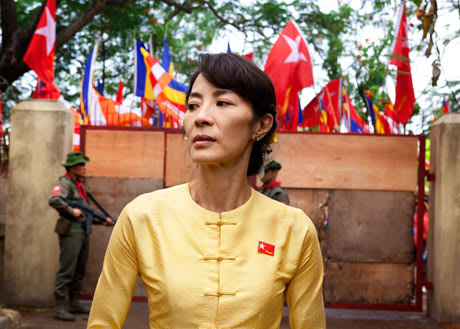Unlike most biopics of late, which exist mainly to vie for Oscars rather than pay any sort of tribute or respect to their subject, Luc Besson's wooden, yet meticulous detailing of the political and private life of Nobel Peace Prize winner Aung San Suu Kyi (Michelle Yeoh) is a restrained and distanced look at the Burmese revolutionary.
The vision here is one that portrays the quotidian and frustrating banality of political manoeuvring and arbitrary red tape, capturing both the elegant determination of the "steel orchid" (Suu Kyi) in Burma while her writer husband, Michael Aris (David Thewlis), battles cancer and raises their two sons back in England.
Confined to house arrest for 15 years when her revolutionary tactics threaten the military junta she seeks to overthrow in favour of democracy, the heart and climax of The Lady often boil down to phone calls between her and Michael, which are in turn either bugged or cut short by the omnipresent military. It makes for very limited dramatic tension, leaving Michael's visibly impending mortality and isolated, glum expression to drive things forward, while Suu Kyi makes political banners in her home and goes on the occasional hunger strike.
This attention to the protracted tedium of such a huge political movement, after our titular heroine decides to sacrifice time with her family to help a nation in need, is both commendable and annoying. Sequences of Michael calling over his sister to help him cook for his children give us an idea of how 15 years of political battle are mostly comprised of waiting around, but do little to give the story any narrative complexity.
Similarly problematic is the depiction of the Tatmadaw as cartoonish boors, with most of them acting as interchangeable monsters without any discernable guiding ethos. Inevitably, this is then juxtaposed with the near perfection of our beloved steel orchid, whose political leanings and overriding grace prove crystal clear.
Yeoh sells the internal struggle of her character, as faced with her own Sophie's Choice, but it's something respected more so from a technical, distanced standpoint than actual investment or engagement. Her performance, like the film itself, is thoughtful and nuanced, but a bit too subtle for its own good.
(Mongrel Media)The vision here is one that portrays the quotidian and frustrating banality of political manoeuvring and arbitrary red tape, capturing both the elegant determination of the "steel orchid" (Suu Kyi) in Burma while her writer husband, Michael Aris (David Thewlis), battles cancer and raises their two sons back in England.
Confined to house arrest for 15 years when her revolutionary tactics threaten the military junta she seeks to overthrow in favour of democracy, the heart and climax of The Lady often boil down to phone calls between her and Michael, which are in turn either bugged or cut short by the omnipresent military. It makes for very limited dramatic tension, leaving Michael's visibly impending mortality and isolated, glum expression to drive things forward, while Suu Kyi makes political banners in her home and goes on the occasional hunger strike.
This attention to the protracted tedium of such a huge political movement, after our titular heroine decides to sacrifice time with her family to help a nation in need, is both commendable and annoying. Sequences of Michael calling over his sister to help him cook for his children give us an idea of how 15 years of political battle are mostly comprised of waiting around, but do little to give the story any narrative complexity.
Similarly problematic is the depiction of the Tatmadaw as cartoonish boors, with most of them acting as interchangeable monsters without any discernable guiding ethos. Inevitably, this is then juxtaposed with the near perfection of our beloved steel orchid, whose political leanings and overriding grace prove crystal clear.
Yeoh sells the internal struggle of her character, as faced with her own Sophie's Choice, but it's something respected more so from a technical, distanced standpoint than actual investment or engagement. Her performance, like the film itself, is thoughtful and nuanced, but a bit too subtle for its own good.




